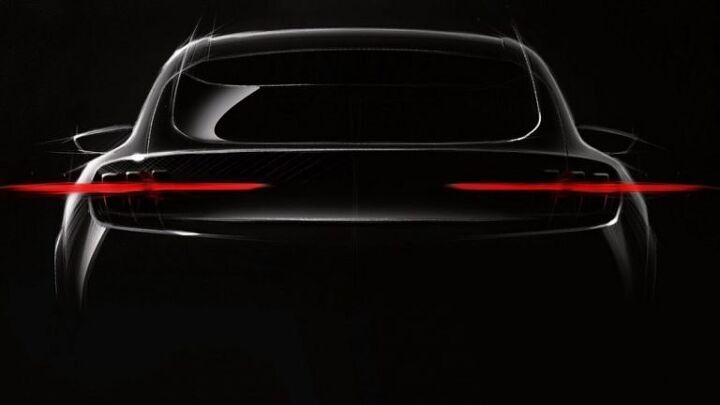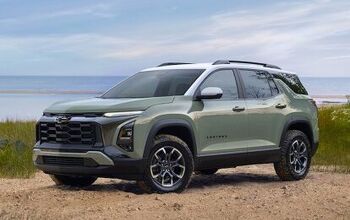Ford: Now's the Right Time to Push Into EVs, Not Yesterday

Ford Motor Company wants the buying public to have no recollection of the slow-selling, painfully short-range Focus Electric. Thankfully, few already do.
The Focus Electric, born of government grants in the wake of President Barack Obama’s post-recession green push, joined the far more popular Nissan Leaf in offering buyers a driving distance of about 75 miles, give or take. Innovative, new, and green, sure, but certainly not desirable for most buyers.
Starting next year, the automaker plans to roll out a cautious crop of strategic electric vehicles. And this time, Ford aims to make money on them.
Speaking to Automotive News, Ford electrification chief Ted Cannis said the time is now right to offer EVs, but only EVs people might want to own. It’s still a tough sell — the EV take rate in the U.S. is less than 2 percent, a figure born of higher sticker prices and limited range that keeps most buyers away. Improvements are continuous. The EVs sold in 2019 are, for the most part, far more advanced and long-legged than the semi-experimental vehicles sold at the decade’s dawn.
“It is critical to think through the customer first,” Cannis said. “It has to be more than a compliance vehicle. It’s got to be better.”
A small EV hatchback isn’t going to cut it with consumers or company beancounters this time around. After dropping $11 billion on an electrification strategy, Ford isn’t about to market an EV that’ll never turn a profit. Pickups, like the upcoming F-150 EV, and crossovers like the so-called “Mustang inspired” Mach E and upcoming Ford/Lincoln midsizers, will apparently command prices that won’t make customers blanche. The popularity of those segments means scale — production volume lofty enough to make the vehicles’ development worthwhile.
“We’re coming in at the right time,” Cannis said. “We could do all sorts of different things, but we’re going to play to what we’re good at: commercial vehicles, vans, pickups, performance vehicles and SUVs. We have loyal customers, we know our base and the margins are better. It’s just the right business.”
There also has to be a tie-in to an existing internal combustion vehicle, at least at first. Hence the creation of an electric F-150 (expected to land in 2021) and not a standalone nameplate, or the Mach E’s connection to the Mustang (the crossover, due out in 2020, does not ride on a Mustang platform, though spy photos reveal a very familiar face).
Unlike Tesla, which promised an EV for the masses for years before quickly spiriting the Model 3 Standard Range back into the automotive ether, Ford acknowledges that segments with higher selling prices are a better fit for a profitable EV model. So that’s where Ford’s, ahem, focus will lie.
To generate interest in the vehicles, Ford plans to roll out a consumer education campaign showing what the technology can do for buyers. A video uploaded earlier this year showing an electric F-150 prototype pulling a train car stacked with gas-powered F-150s, generated a lot of interest in the idea of an EV truck. Gobs of instantaneous torque is a selling feature to truck buyers.
According to Cannis, 18 percent of respondents to an internal survey said they’d consider buying a vehicle like that, compared to 10 percent before the video aired. Electric propulsion will continue to have a large number of detractors, but if enough buyers take to the technology, Ford can earn a profit.
“Let’s say of the 800,000 F series that we sell a year, just 10 percent are interested. That’s still 80,000 vehicles. These are huge numbers,” Cannis said.
With lofty F-150 trims commanding steep prices that buyers appear all too ready to pay, an electric model, perhaps a less opulent one to lower the tech-born markup, could find a sustainable home in the lineup.
“They’ll target volume segments where they won’t have to subsidize them too much,” Sam Abuelsamid, principal research analyst at Navigant Research, said of Ford’s strategy. “They won’t go down the Chevy Bolt or Nissan Leaf path.”
[Images: Ford]

More by Steph Willems
Latest Car Reviews
Read moreLatest Product Reviews
Read moreRecent Comments
- Probert They already have hybrids, but these won't ever be them as they are built on the modular E-GMP skateboard.
- Justin You guys still looking for that sportbak? I just saw one on the Facebook marketplace in Arizona
- 28-Cars-Later I cannot remember what happens now, but there are whiteblocks in this period which develop a "tick" like sound which indicates they are toast (maybe head gasket?). Ten or so years ago I looked at an '03 or '04 S60 (I forget why) and I brought my Volvo indy along to tell me if it was worth my time - it ticked and that's when I learned this. This XC90 is probably worth about $300 as it sits, not kidding, and it will cost you conservatively $2500 for an engine swap (all the ones I see on car-part.com have north of 130K miles starting at $1,100 and that's not including freight to a shop, shop labor, other internals to do such as timing belt while engine out etc).
- 28-Cars-Later Ford reported it lost $132,000 for each of its 10,000 electric vehicles sold in the first quarter of 2024, according to CNN. The sales were down 20 percent from the first quarter of 2023 and would “drag down earnings for the company overall.”The losses include “hundreds of millions being spent on research and development of the next generation of EVs for Ford. Those investments are years away from paying off.” [if they ever are recouped] Ford is the only major carmaker breaking out EV numbers by themselves. But other marques likely suffer similar losses. https://www.zerohedge.com/political/fords-120000-loss-vehicle-shows-california-ev-goals-are-impossible Given these facts, how did Tesla ever produce anything in volume let alone profit?
- AZFelix Let's forego all of this dilly-dallying with autonomous cars and cut right to the chase and the only real solution.



































Comments
Join the conversation
It would be an incredible achievement if Ford is able to make a profitable 50-state available F-150ev with an ~250 mile unladen usable range, an ~1000lb payload capacity, and ~8000lbs towing capacity for $10K over the price of a 2.7t version.
Good luck to Ford. I think they will come strong on these (tired of getting their butts kicked), and I imagine the take rate might surprise everyone (similar to the way V6/EcoBoost worked out).